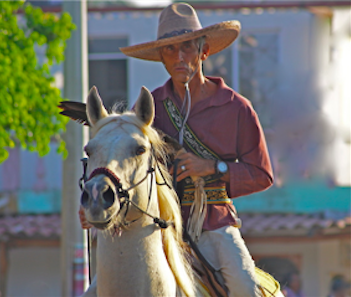(3) Indigenizing Coursework
Working for Indigenous sovereignty will work best when coupled with an understanding of the advantages of Indigenization for all people. Giving First Nations back the freedom to control their education will happen faster when we realize the Indigenous worldview belongs to us all, and can offer solution to the existential crises facing life on Earth. It guided us for 99 percent of human history and, according to a large body of literature, did so without the kind of violence to ourselves and our planet. Many worldview comparison charts are available on the Internet that students and faculty can use for relevant discussion in each course. Such conversations can seek complementarity between the two worldviews or recognize areas where returning fully to an Indigenous precept about the world makes sense.
Decolonization and Indigenization are not just things to add to other "social/ecological justice" targets. They are intrinsic in the same way that any reference to social justice remains inseparable from ecological justice and sustainability. Ultimately, colonized thinking continues loss of human rights, rampant inequality, blatant racism or unconscious bias, hate crimes, and winner-take-all based violence. They are institutionalized in legal systems and education. Working within colonized systems that assume and support imperial, patriarchal nation-state, free-market capitalism, neo-liberalism, and hierarchical rule to obtain social/ecological justice is an impossible task. Although higher education generally reflects these same assumptions, it has the potential to originate a positive transformation.
Thus, we must ask two questions in every class: "What assumptions relating to the subject contribute to a better world and which ones reproduce or sustain practices that make it worse? This question applies whether or not the course is directly related to social/ecological justice. The second question is, "What alternative, Indigenous-based ways of thinking would be more likely to prevent such problems?"
(4) Making the Commitment
The fourth step must, of course, be the first step. Universities respond to having been pressured to start "Diversity and Inclusion" initiatives that give voice to marginalized students, offer programs that promote women's rights and gender identity, and prevent racism and implicit bias. However, such programs fail to recognize that the opposite of exclusion is not inclusion, it is decolonization. Even with more and more rhetoric specifically about decolonizing higher education, it is rarely an "across the curricula" project. The lack of commitment of faculty, closely related to the lack of involvement of management, exists because, in essence, colleges and universities are fundamental tools of colonization. It is in the proverbial woodwork as much as it is the consciousness of most faculty and administrators in higher education. Of course, it is also in the consciousness of most students, even those who come to learn ways to change the colonized system.
The reason for lack of motivation and commitment to the decolonizing of higher education is that it is the default program. Rauna Kuokkanen addresses this in Reshaping the University: Responsibility, Indigenous Epistemes, and the Logic of the Gift (2010). She explains that the "Indigenous episteme" is marginalized, dismissed or invisible within universities. The most compassionate social/ecological justice educators inadvertently step on their toes by holding on to colonized values and precepts. One example believing in exchanging value for value as a given standard rather than "the logic of the gift," an Indigenous worldview way that is profoundly different and involves an emphasis on generosity, non-hierarchical relationships, interdependence and responsibility for working in behalf of others, including non-humans, for its own sake. Again, regular referencing to a worldview comparison chart between the dominant and the Indigenous worldview can bring awareness and considerations about transformation to such differences.
So what might motivate commitment to decolonizing all curriculum in higher education? Certainly, the Coronavirus pandemic now upon us might give some incentive. However, well-intended administrators and faculty will have to recognize that standard educational practices themselves must change, and it may be unrealistic to think this will happen in most environments. Higher education's efforts at governing and decision-making that emphasizes collaboration between administration and faculty have not historically been effective in making timely transformations. Too often, grand ideas suffer "death by committee." This happens for a number of reasons, but one that the literature on it does not express relates to how the most even the most passionate social/ecological justice advocates bump into the unconscious colonized walls and pathways. The "new managerialism" phenomenon in higher education is part of this dilemma.
For these reasons, I propose that decolonizing the curriculum starts with the courageous autonomous commitment of individual faculty to follow the three steps above. If this can be accomplished in concert with collaboration, peer-review, or support from various others, it is all the better. Similarly, it can be helpful if the administration can implement a plan that allows for such faculty independence while finding ways to hold faculty responsible for the commitment. However, Indigenous worldview holds that the highest authority for action is honest reflection on lived experience with the deep understanding that all of life on Earth is intimately interconnected. This leads to autonomous, courageous decision-making that is always on behalf of community and the greater good. Hierarchical systems that do not reflect reverse dominance hierarchy usually obstruct more than they assist.
Below are 11 concepts and practices that reflect colonized thinking. These can be addressed in most any course.. If individual faculty realize the effect of colonized hegemony on what is happening in our world today, then perhaps with only the few ideas I offer here, more and more will come forward until the "hundredth monkey" causes a quantum leap.
1.Progress (Never-ending growth, corporate control of life-support systems)
2."Winning " (Uncooperative competition for self promotion)
3. Unlimited Wealth, Capitalism, materialism over life
4. Spiritual Separation from Nature and Interconnectedness
5. Disruption of Ritual and Ceremony
6. Childlike Dependence and lack of taking responsibility
(Note: You can view every article as one long page if you sign up as an Advocate Member, or higher).





